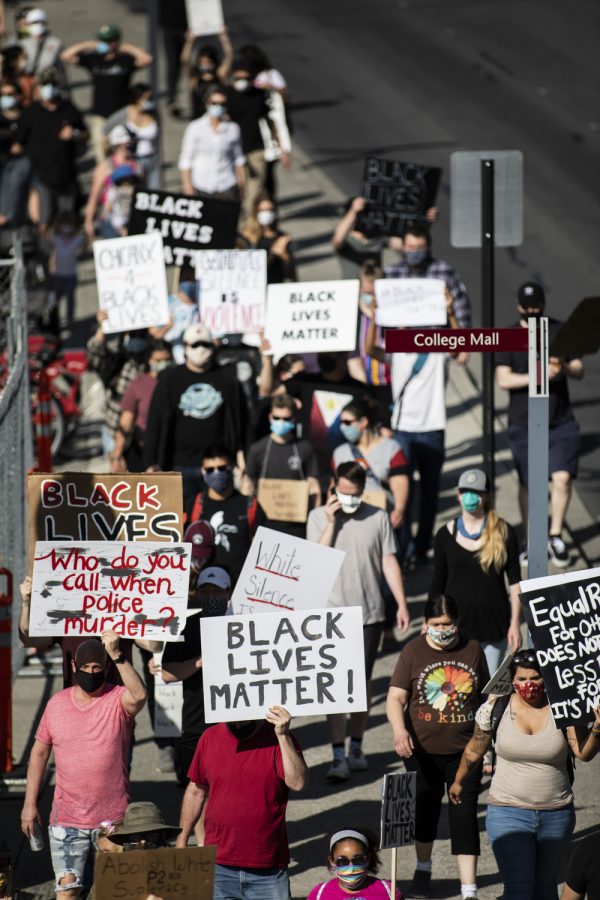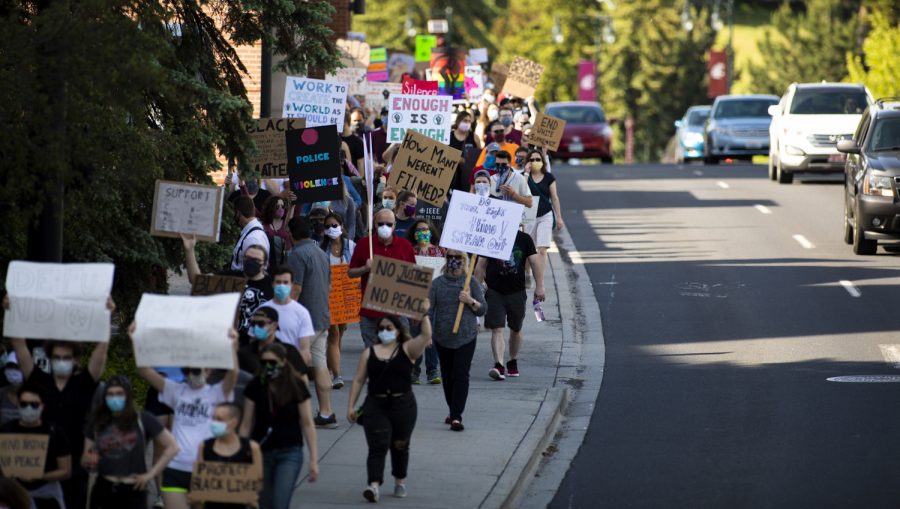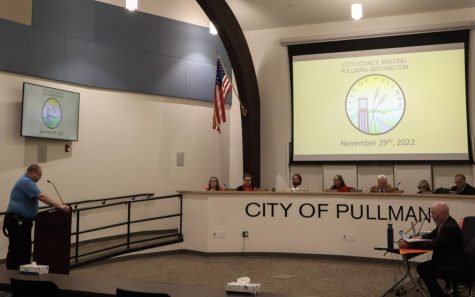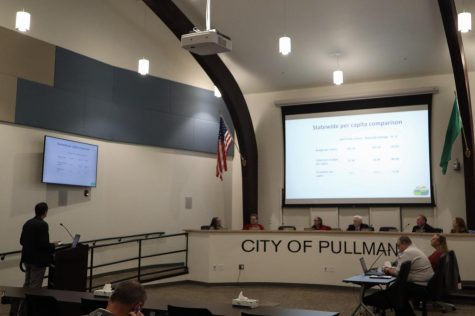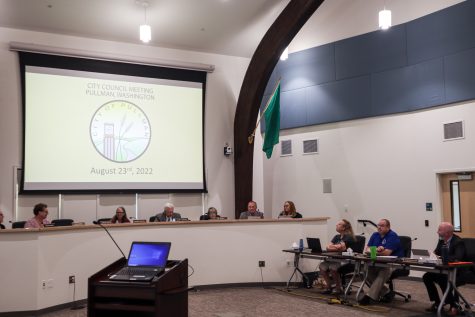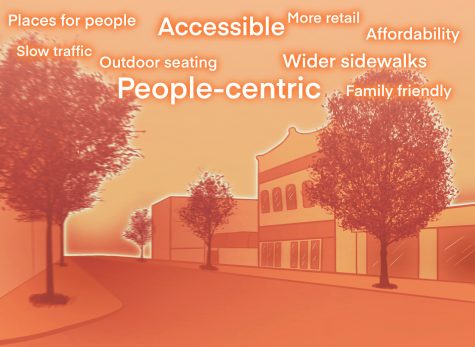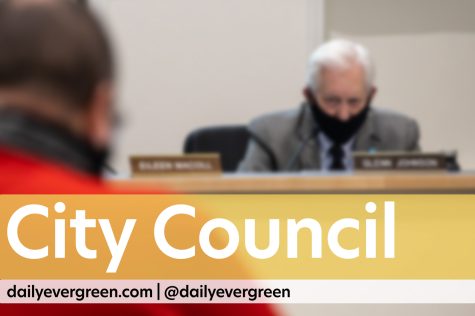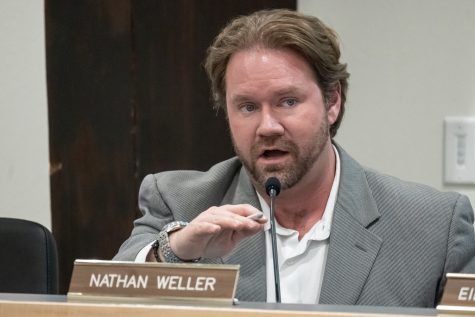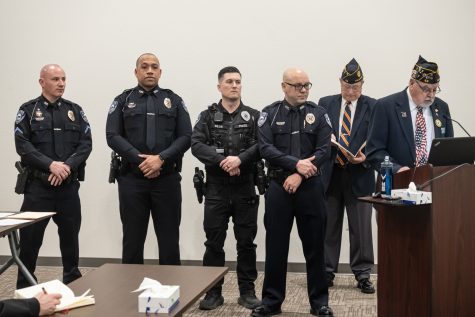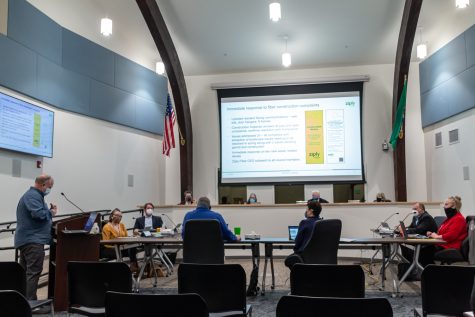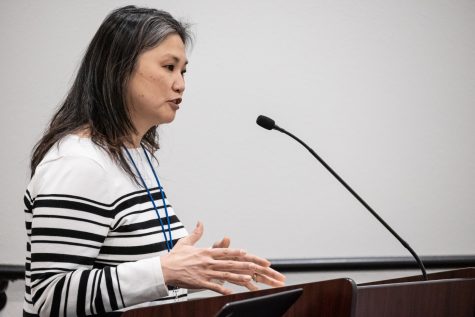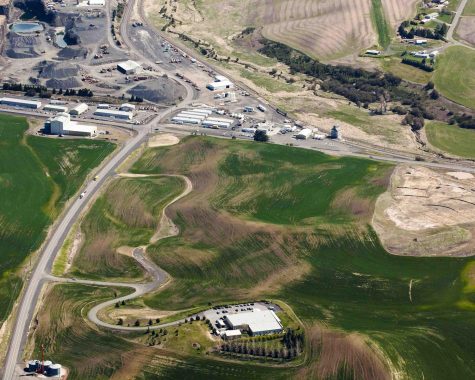Demonstrators march against systemic racism
One demonstrator shared stories of encounters between WSU students, police officers
Protesters gathered at Martin Stadium and marched to Pullman City Hall where they held a rally in support of the Black Lives Matter movement Friday evening.
June 13, 2020
Around 200 people marched and chanted from Martin Stadium to Pullman City Hall on Friday in support of the Black Lives Matter movement and the fight against systemic racism.
Ivy Ndambuki, co-organizer of the march, said small communities like Pullman have the capacity for big changes. She said change begins here.
“We’ve been marching for years,” she said at the demonstration in front of city hall. “We will continue to march until real change is made.”
Ndambuki said she and other community members have been thinking about, and are trying to, establish a local Black Lives Matter chapter. She does not know what the process will entail, she said, but is looking forward to finding out.
Ndambuki was born in Kenya but grew up in Pullman. She said she attended WSU and experienced microaggressions from her peers. Ndambuki referred to the history of Pullman and how the city burned down multiple times. She said there are still institutional reminders of inequality.
Ndambuki said she was moved by the number of people who showed up in front of city hall. She said she asked some WSU students about their encounters with the police, who then shared those stories with the crowd.
One Black student told Ndambuki WSU Police had stopped him multiple times for walking down the street, she said. Another student of color said police officers had spoken to her condescendingly and intimidated her into giving them personal information, which was prohibited by her job.
However, Ndambuki said not all stories people told her were negative. One student told her an officer from the Pullman Police Department guided her to resources that she needed. Ndambuki said this is how policing should be.
Jason Kennedy, co-organizer of the demonstration and member of the band “State of Krisis,” said the demonstration’s purpose was to enact change and inspire others to enact change. There were children and young people in the crowd, he said, and seeing them understand the movement is everything to him.
In front of the city hall, Kennedy said George Floyd was not the first Black person to be killed, and that affects him because he is also a Black man himself.
“How much louder do we have to make our voice before it’s heard, before the police are defunded, reborn and reorganized, and made to police them-damn-selves?” he said at the demonstration.
WSU Dean of Students Jill Creighton also addressed the crowd.
“I’m here to say Black lives matter,” she said. “I stand up here today as a person, as a woman of color, who lives in a world where I am often told it is not polite to talk about [race].”
Creighton said the movement does not end with a march, protest, a tweet or having difficult conversations with loved ones. This is the beginning, she said.
The Pullman community must continue to do work in order to enact change, she said.
People need to think about the situations that have led to other demonstrations across the nation, she said. This includes how people of color have to constantly censor themselves in public, especially while at work, by changing the way they wear their hair, dress, act or speak.
“Stop forcing marginalized people to make a spectacle of our pain in order to be heard,” Creighton said at the demonstration.
Jaime Nolan, associate vice president for community, equity and inclusive excellence for WSU’s Division of Student Affairs, also spoke in front of the crowd. She said she is a mixed-race Latina who moves through the world with white privilege.
She said identifying and acknowledging the history of the country and its institutions is a way to begin change.
“We love the narrative of progress, but we never deal with our narrative of tragedy in the country,” she said at the demonstration, “It’s killed people all along the way.”
She said WSU is guilty of claiming diversity and inclusion, as well as enrolling students who represent those things. However, the university fails to “do the work” to actually be diverse and inclusive, she said.
Nolan said she pledges, as a WSU administrator, to do the work.
“We cannot treat this like some self-help movement where we can go and pick a book off the shelf and say ‘I’m done,'” she said to the crowd.
Nolan said it is an aspiration to be in solidarity, anti-racist and understanding. She said this cannot be achieved by reading a book, but it is a way of being.
“I cannot call myself an ally. I cannot call myself those things,” she said at the demonstration. “I will know it when I see things changing around me.”
She said justice does not end at discussions of race because climate justice, economic justice and food justice are also components of racial justice.
Jason Skiles, demonstrator and member of the band “State of Krisis,” told the crowd that he is angry because of systemic racism, and that he has responded angrily to people who were “being stupid.”
“I did not help the cause with my responses to those individuals,” he said at the demonstration. “I used to be an idiot a long time ago … I learned. Why can’t they?”
He said he learned that he needs to educate other white people by building their knowledge rather than belittling them or tearing them down. He said he knows he has white privilege because he had to learn about racism slowly and through stories from people of color.
“I have the privilege to travel to almost any neighborhood in the United States, sit down and not be harassed,” he said at the demonstration.
Skiles said this does not mean white people have it easy or do not face hardships in life, but it does mean that those hardships are not due to the color of their skin.
“For anyone who doesn’t know what white privilege is,” he said at the demonstration, “it is the privilege of not having your skin tone make your life harder.”
Kennedy said he is used to receiving back-handed racist comments like, “You look like this Black person I know,” or “I didn’t even know you were Black.” He said he has to deal with it and laugh along because it makes those people comfortable.
Kennedy said he has to explain race to his children. Even though he should not have to, he does, because incidents of police misconduct occur in every city.
“It happens in every city, but not every city gets to put it on social media,” he said at the demonstration.
Kennedy said he has not been camping since he was 22 years old because the last time he was camping, he was chased through the woods by men screaming the n-word at him. He said he jumped into some bushes and hid there while the men looked for him.
“That was the first time in my life that I was scared for my life,” he said to the crowd. “They were drunk, and they were racist, and I happened to be there.”
Kennedy said change is no longer a discussion, and it is something that needs to happen now.
“I’m not asking you to fight for me. I’m not asking you to fight with me. I’m not asking for you to stand next to me. I’m not asking you to speak for me. I’m not asking for you to bring weapons to the war for me,” he said to the crowd. “What I’m asking is for you to understand why I’m fighting.”

